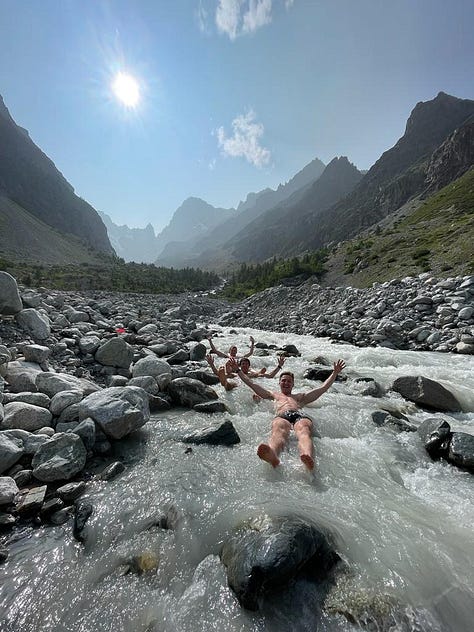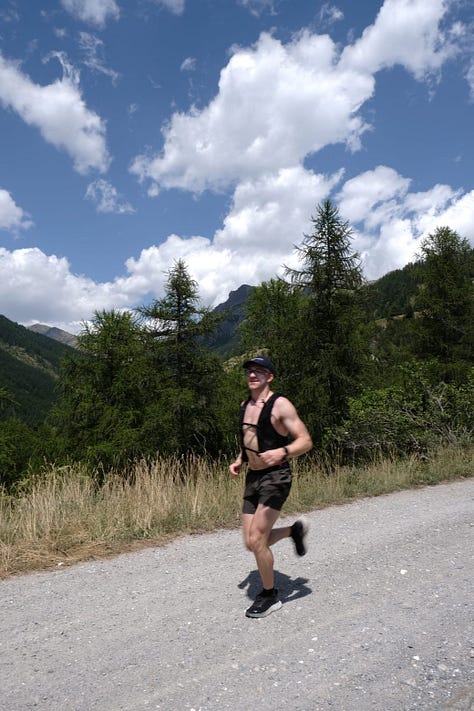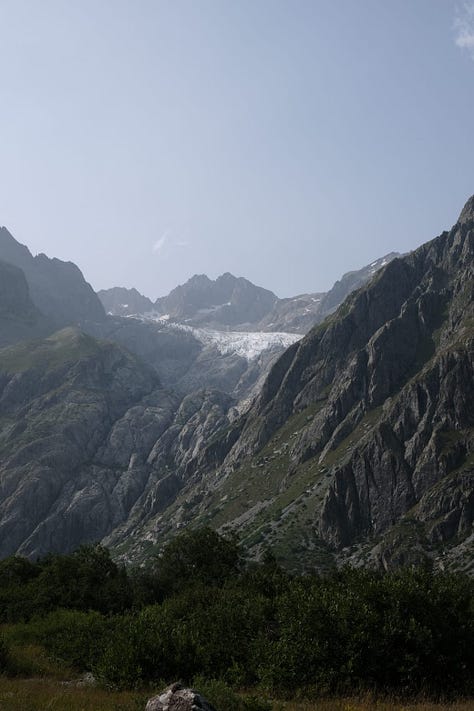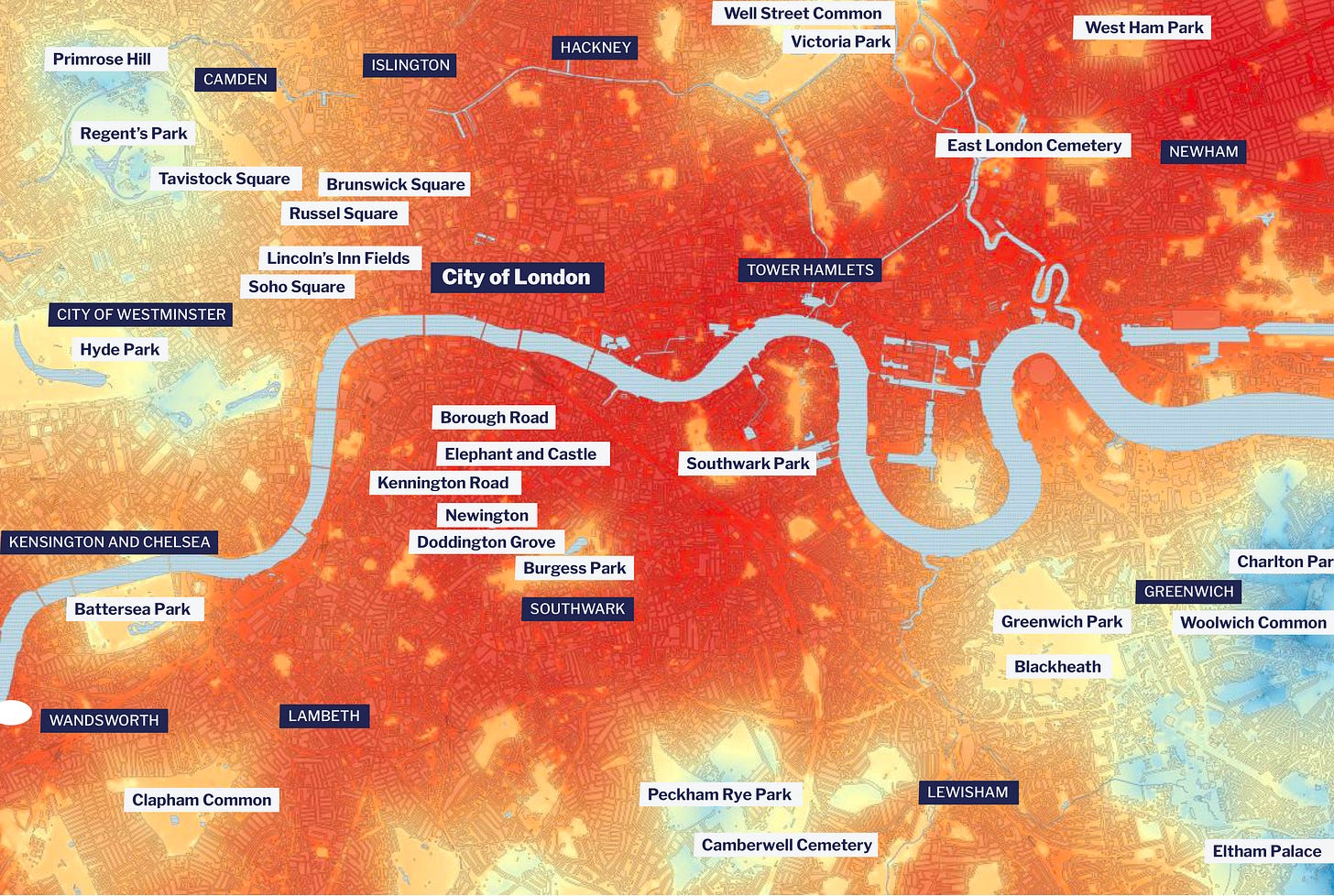🌱 The Grumpy Optimists #101
Spending time in nature really makes you feel great...
Happy Monday. 👋
Welcome back to The Grumpy Optimists after a two-week hiatus. I managed to take a two-week road trip around France, recharge, exercise, consume many a pastry, beer and glass of red wine and spent time in some incredible locations. I feel great and came away empowered.
The beauty of the Alps was pretty outstanding. It wasn’t just the huge mountain ranges that were impressive, it was the resilience of the alpine flowers the insects and bugs that come with them and the plants that find the tiniest bit of moss on the side of a rock to grow, only to be covered in 10 feet of snow in after 6 months. Highlights were being able to drink directly from glacial taps while out running through the mountains. Lowlights were seeing the decline of glaciers like Glacier Blanc.
Other than making me want to spend a summer running around the Alps, I came away with a stronger desire than ever to dedicate my life to fighting climate change so that future generations can have the joy of living on this really great planet we call home.



Now the personal recap is over, there is a lot of positive climate news to cover this week, without further ado, let’s get into it.👇🏻
👀 Articles to read
🍫 Nestle to focus on emission reductions, not offsets. Nestlé, the global food and beverage company is shifting away from using carbon offsets as part of its net zero commitments and instead focusing and operational and value chain emission reductions. Nestle’s decision comes as more companies are reconsidering their reliance on offsets, with Gucci for example, dropping their carbon-neutral pledges that relied heavily on offsets. This is a positive shift in approach for how companies are looking to take climate action and a sign that companies are starting to realise that real climate action requires drastic cuts in emissions.
📦 Amazon push suppliers to report their carbon emissions and set climate targets. In its 2022 Sustainability Report, Amazon announced that it will update its Supply Chain Standards next year to require suppliers to report their carbon emissions data and set emissions reduction goals. This is huge news and will create a positive knock-on effect throughout Amazon's supply chain. Amazon said that it will use its size and scale to help suppliers that are committed to decarbonisation and be part of the solution. Hopefully, this will reward brands that care but more is needed to stop overconsumption.
🛢️Canada implement a framework to phase out fossil fuel subsidies. Canada is the first G20 country to release a framework for eliminating inefficient fossil fuel subsidies. The framework will apply to existing tax measures and 129 non-tax measures, but Ottawa will not cancel any ongoing multi-year subsidy agreements that are already in place. There has been some criticism that the subsidies don’t cover carbon capture and storage (CCS) and public financing of fossil fuel projects that are government-owned, effectively providing a license to continue to pollute. It’s a hard balance to get right but it’s progress.
🌲 Trees are really cool and our cities need more of them. A study by Friends of the Earth found that trees and green spaces can help cool cities by up to 5°C but nearly 50% of neighbourhoods in English towns and cities have less than 10% tree cover with over a third lacking adequate access to green space. Unsurprisingly, people of colour and people on lower incomes are disproportionately affected by a lack of cooling near their homes. With the UK Health Agency recording 2,803 excess deaths over the summer heatwave of 2022 the case for planting more trees and creating green space in cities is crucial not just to planetary but also to human health.
⚖️ Climate litigation goes big in 2022. Climate litigation is a growing trend, with the number of cases filed increasing from 884 in 2017 to 2,180 in 2022. Children and youth, women's groups, local communities, and Indigenous Peoples are taking a leading role in bringing these cases. The report demonstrates the importance of an environmental rule of law in combating the triple planetary crises of climate change, biodiversity loss, and pollution.
🏄🏻♂️ British clothing brand Finisterre launched Yulex wetsuit rental to minimise surfing’s climate impact. The rental service will enable people to test the performance of Yulex wetsuits and help them make the switch from fossil fuel-based neoprene to a more environmentally and socially responsible alternative.
🛒 German supermarket trials charging true climate cost of foods. The German supermarket, Penny, has raised the prices of a selection of its products to reflect their real cost to people’s health and the environment. The experiment is taking place in conjunction with academics from the Nuremberg Institute of Technology and the University of Greifswald. Prices increase by 30% for products such as mozzarella, yoghurt and sausages. The supermarket will donate the excess proceeds from the sales to a charity that supports family-run farms in Alpine regions.
🥼 Could the superconductor be the answer to solving climate change? A team of scientists in South Korea claimed to have developed a room-temperature superconductor. There’s been a lot of scepticism about the validity of the results and whether the new material, called LK-99, is actually real, but there is growing optimism that the new material could be feasible. Why it matters? Superconductors that can operate at room temperature and ambient pressure would have a number of potential applications, including quantum computing, a more efficient energy grid, and producing energy from fusion.
🚜 How much do we really need fertiliser? Despite a decline in fertiliser use, UK crop yields rose last year. This suggests that we may not need as much fossil fuel-based fertiliser as we thought. The rising cost of natural gas, which is used to make artificial fertiliser, is likely a factor in the declining use. Farmers are instead looking towards natural alternatives such as compost, manure, and cover crops. The findings from Defra are a welcome development, as they suggest that we may be able to produce more food whilst reducing our environmental impact.
My company, Zevero, has written a blog post about the on-farm impact of malt and barley that shows why the reduction of synthetic fertilisers is crucial to decarbonising agriculture. You can read it here.
This week’s episode was written to the new Bombay Bicycle Club track in my new room after consuming a small part of the giant courgettes I managed to harvest when I came back from holiday. If anybody is in London and would like courgettes, I could actually feed a small army so please let me know what recipes I could make with them.
George, the Grumpy Optimist 💚




